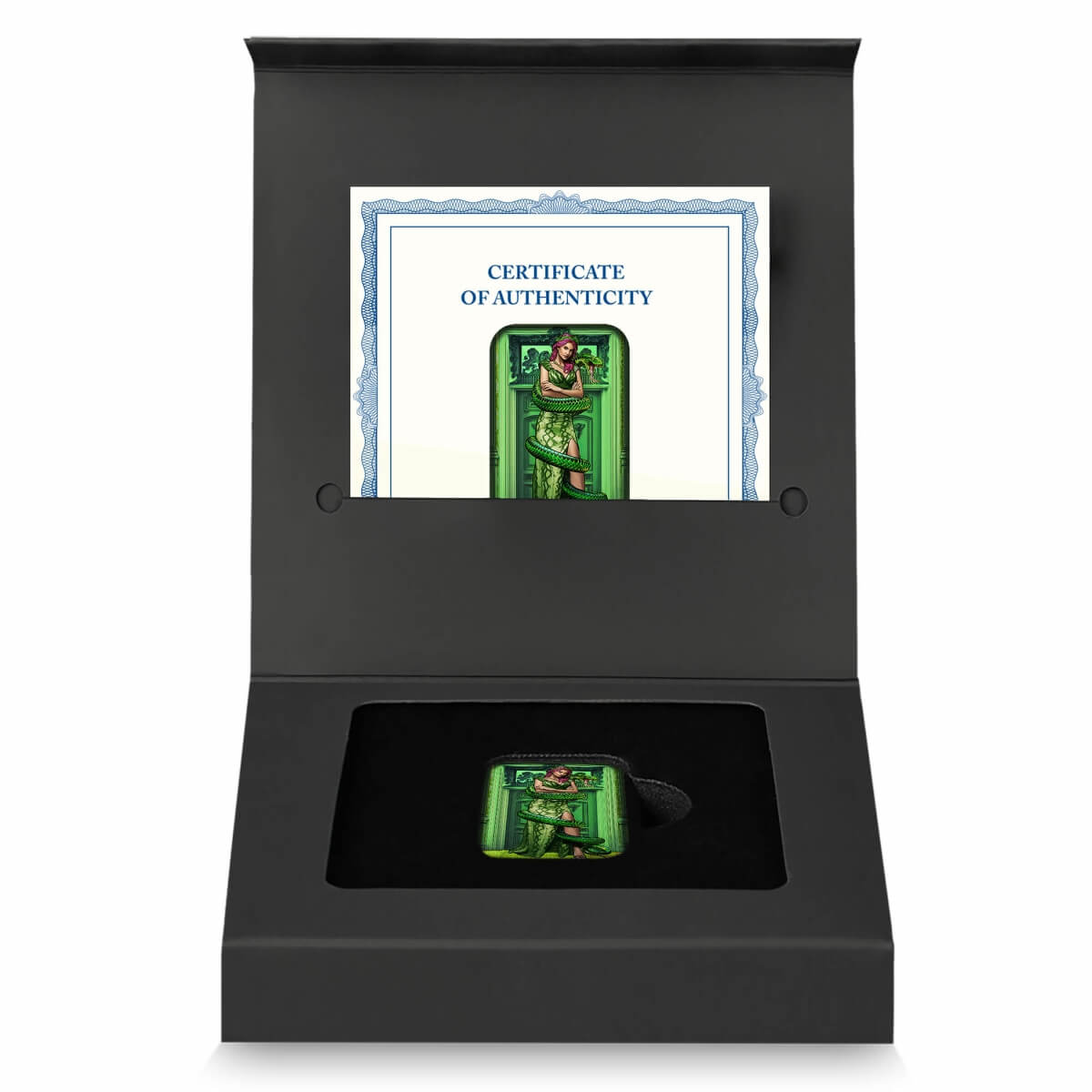2024 The Seven Deadly Sins Envy 2 oz Silver Colorized Premium Cast Bar
Original price was: $170.00.$165.00Current price is: $165.00. USD
Item specifics
| Year of Issue: | 2024 |
| Weight: | 2 oz |
| Composition: | Silver |
| Purity: | 0.9999 |
| Mintage: | 500 |
| Finish: | Antiqued |
| Special Feature: | Colorized, Individually Numbered |
| Diameter: | 40.13 x 25.07 x 7.5 mm |
| Certification: | Mint Certified |
| Packaging: | Display Box |
Description
Envy is one of the seven deadly sins, characterised by a feeling of resentment or desire towards the qualities, achievements or possessions of another person. It manifests itself when a person feels sadness, disgust or anger because another possesses something he or she does not have. Envy involves not only wanting what the other person has, but also desiring that the other person not have it.
This sin is destructive both to the individual who feels it and to interpersonal relationships. At its core, envy undermines inner peace and generates conflict, as it can lead to harmful and hostile behaviour, such as slander, sabotage and betrayal. In addition, envy prevents recognition of one’s own blessings and achievements, fostering a cycle of dissatisfaction and negativity.
Historically, envy has been depicted in art and literature as a dark and malevolent figure, often portrayed as a venomous serpent representing the poisonous nature of sin, warning of its dangers and promoting the virtue of gratitude and humility as antidotes.
The concept of the cardinal sin of envy appears in various religions, primarily in Christianity, but it also has parallels in other traditions.
Here is how envy is understood and dealt with in different religious contexts:
- ChristianityIn Christianity, sloth is one of the seven deadly sins. It is considered a vice because it implies an unwillingness to work or to fulfil personal, professional and spiritual responsibilities. Sloth refers not only to physical neglect, but also to spiritual indifference, which manifests itself in a lack of devotion and personal growth in faith. This sin can lead to neglect of obligations to God and the community, negatively affecting the individual’s spiritual life.
- JudaismIn Judaism, sloth is seen as an obstacle to fulfilling mitzvot (commandments) and ethical and religious responsibilities. Jewish tradition values diligence and effort in Torah study and the practice of good deeds. Laziness is considered a lack of discipline and an impediment to living a virtuous and fulfilling life. Rabbinic texts warn against laziness, emphasising the importance of hard work and dedication to God and the community.
- IslamIn Islam, envy (hasad) is seen as a grave sin and is condemned in the Qur’an and Hadith (sayings of the Prophet Muhammad). The Qur’an warns against envy and describes it as a destructive force that can lead to spiritual and moral ruin. Muslims are exhorted to seek refuge in God against the evil of the envious (Surah Al-Falaq, 113:5). Envy is considered a lack of acceptance of God’s will and a form of wishing evil for others, which is incompatible with the values of brotherhood and generosity promoted in Islam.
- BuddhismIn Buddhism, envy (issā) is considered one of the causes of suffering and an impediment to spiritual development. It is classified as one of the five minor mental impurities in the Abhidharma. The Buddha taught that envy arises from desire and attachment, and leads to dissatisfaction and conflict. The practice of meditation and the cultivation of positive qualities such as empathic joy (mudita) at the happiness and success of others are recommended as antidotes to envy. The aim is to achieve a state of equanimity and inner peace.
In all these traditions, envy is seen as a sin or moral failing that must be overcome in order to achieve a virtuous and fulfilling life. Although specific teachings and approaches vary, they all agree that envy is detrimental to the individual and society, and promote gratitude, compassion and neighbourly love as the opposite virtues.
Reviews
There are no reviews yet.









Reviews
There are no reviews yet.